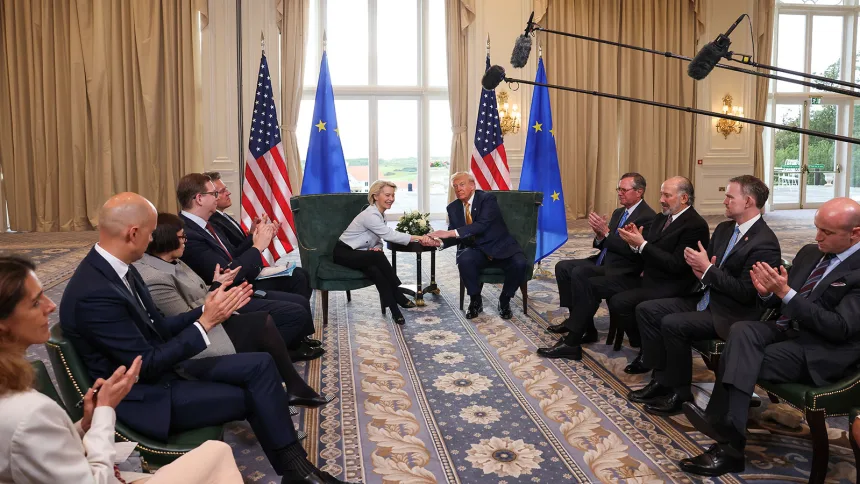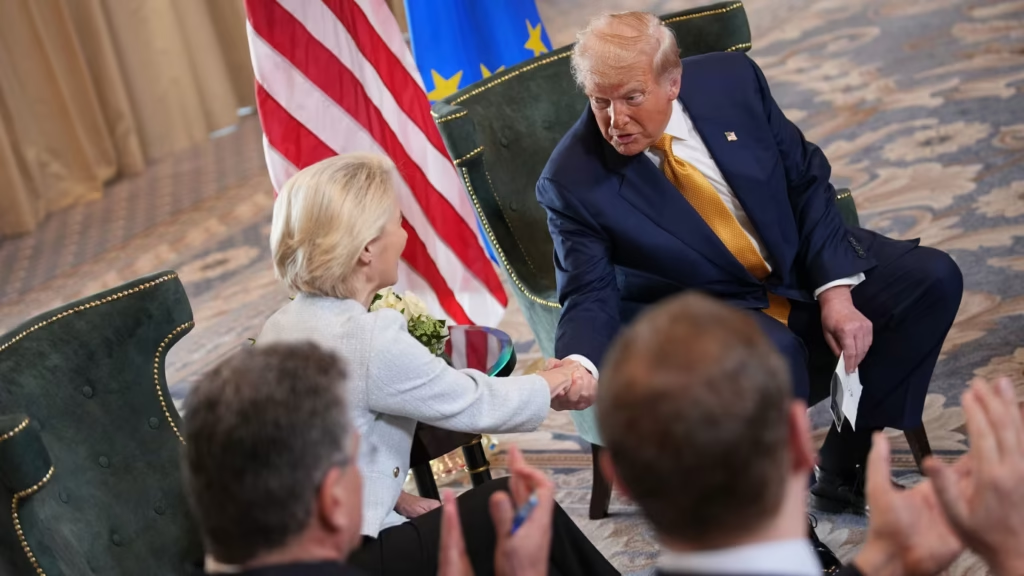
Former President Donald Trump recently declared a significant political and economic triumph after obtaining a revised trade agreement with the European Union, marking his assertive reentry into the global trade arena. Nonetheless, although pressuring Brussels might have yielded instant political benefits, specialists warn that using similar strategies against China — a significantly different economic adversary — will prove to be a much more intricate and risky undertaking.
Trump’s revised EU agreement relied significantly on using tariffs, which included warnings aimed at European vehicles and farm products. By leveraging pressure, bold negotiations, and well-timed strategies during Europe’s economic strain, the EU acquiesced, granting concessions on American agricultural products and tech regulatory alignment. It was a quintessential Trump maneuver: separate, intimidate, and negotiate fiercely.

However, China differs from the EU. While Brussels functions as a coalition of democratic economies that depend on diplomatic agreements, Beijing uses a centralized power structure, significant internal strength, and a long-term strategic perspective. Trump’s earlier tariffs during his initial term resulted in a harsh trade war but did not significantly alter the trade imbalance between the U.S. and China. China navigated challenges by broadening supply chains, strengthening relationships with emerging markets, and shifting focus towards self-sufficiency in crucial technology sectors.
Additionally, China’s political framework provides it with a distinctive capacity to endure economic hardships. Although European leaders encounter domestic electoral consequences from any decline, China’s ruling Communist Party is sheltered from such pressures, allowing it more latitude to pursue long-term strategies.
Trump’s harsh language has rekindled concerns about a revived U.S.–China trade conflict, with markets responding anxiously to his remarks on “decoupling” and implementing tighter export regulations. In contrast to the EU, China is not expected to yield to pressure.
It might instead strike precisely — focusing on U.S. agriculture, technology firms, or rare earth shipments.
In summary, although Trump might have outsmarted a divided Europe, China stands as a coordinated, strategic, and resistant adversary. Adopting a similar aggressive tone may resonate positively at home, yet it poses the danger of causing an economically disastrous impasse — one that is significantly harder to over
Xi Possesses Strategic Advantage Over Trump as U.S.–China Strains Reemerge

With his political comeback, former President Donald Trump reiterates his strict position on China, while Chinese President Xi Jinping finds himself in a remarkably advantageous position. Trump might depend on rhetoric, tariffs, and decoupling stories to gain domestic backing, whereas Xi possesses a more comprehensive set of economic and geopolitical advantages—capabilities that could confront or potentially surpass a Trump-led America.
Initially, China’s worldwide economic presence has expanded considerably since Trump’s initial term. Across Latin America, Africa, and Southeast Asia, Beijing has established a strong presence via trade, debt diplomacy, and infrastructure initiatives tied to the Belt and Road Initiative. Xi can use these connections to diplomatically and economically isolate the U.S. if Trump intensifies another trade conflict.
Secondly, China is the top purchaser of U.S. agricultural exports, especially soybeans and corn. In past tariff conflicts, Beijing deliberately halted purchases, negatively impacting Trump’s rural voter support. If comparable strategies are used once more, Xi can exert targeted economic pressure where it adversely affects Trump politically.
Moreover, China oversees nearly 70% of global rare earth mineral processing, crucial for electronics, defense technologies, and renewable energy solutions. Should tensions rise, Xi might restrict exports, leading to significant interruptions in American supply chains.
Xi has hastened initiatives for self-sufficiency in semiconductors and artificial intelligence, decreasing China’s exposure to U.S. sanctions. At the same time, the yuan is being advanced globally, quietly contesting the supremacy of the U.S. dollar.
Ultimately, Xi’s partnership with Russia, Iran, and segments of the Global South forms an expanding anti-Western coalition that may hinder Trump’s efforts to diplomatically isolate China.
Though Trump might impose tariffs and sever ties, Xi has a wider and more subtle range of tools at his disposal, yet they are equally powerful. The forthcoming geopolitical showdown might shape not just their individual legacies—but also the world order for years to come.



“You won’t find this kind of analysis anywhere else. Xenix News really digs deep !”check this out 👇
👉👉👉👉👉 xenixnews.com